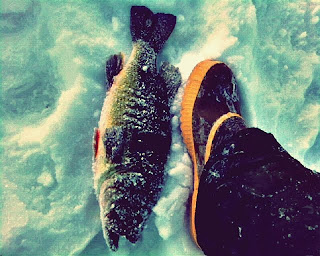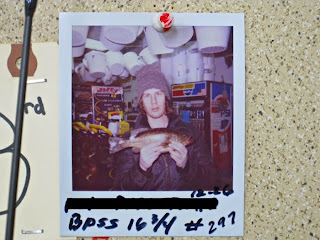It was almost dark. From the window he watched the wind tossing the little jack pines, throwing the snow that weighed low the branches. The fire was raging now in the stove. Drinking beside the stove Jim was finally warm. There was the feeling of having fished and come in when the day was done. It was like it always felt, he told himself.
Jim finished the glass and pushed it across the table. It was time to go down and see his grandfather. Jim laced up his boots and put on his jacket and wool hat and went out onto the porch. It was fully dark. Jim switched on the porchlight.
In the tip-up bucket on the porch was the bass. Jim looked in at him, dark-green backed, white-bellied and frosted with snow. It had been exciting to catch him. Jim reached down and touched him, hard and frozen to the touch. They had caught and eaten many like this one. Maybe he would get another tomorrow and he and his grandfather would have a fish dinner tomorrow night.
Jim started down the road for his grandfather’s house. The road turned to follow a wall of towering red pines, evenly spaced, planted two-by-two along the road. They had been planted by his great-grandfather. Beyond the pine wall the farmland extended out to the mountain. The wind blew down across the snowy fields and the pines were no protection along the road and Jim walked quickly until out beyond the last pines he saw the cottage.
Jim stamped the snow from his boots and went in through the side door into the kitchen. Inside it was dark, the lights were off, and it smelled pleasantly of wood smoke.
In the family room his grandfather was snoring loudly in his armchair beside the fireplace. The fire had burned down to the coals. Jim switched on the light. On the table beside his grandfather was what remained of his vodka tonic. A crossword puzzle was spread across his lap.
“Grandpa,” Jim said gently.
“Grandpa.”
Jim touched his shoulder.
“Grandpa.”
The old man started and opened his eyes and smiled seeing his grandson.
“Jimmy!”
He pulled himself up from the chair and hugged Jim tightly.
“Jimmy it’s so good to see you. It’s so good to have you up here again.”
“It’s great to be up here again, Grandpa,” said Jim.
“I thought maybe you might be coming down after fishing,” his grandfather said. “Let’s go in the kitchen and get us something to drink.”
“Sure.”
“You know, I almost forgot. I’ve got something special for us. You wait right here, Jimmy.”
The old man shuffled across the room and out the door into the night. He did not take his jacket and Jim had a pretty good idea what he was going for.
Jim knelt down at the fireplace and laid in some pieces of kindling over the coals. He put a birch log on the grate and ignited the paper under the kindling, watching the paper flare up and the kindling crackle and catch.
The door opened, cold rushing in from the outside, and his grandfather had returned with the green bottle.
“Jimmy, I’ve got something real special to celebrate your being back up here. Come on in the kitchen.”
“I figured it was that Grandpa.” They were both smiling.
Grandpa Olof looked in the cupboard for the special glasses. The bottle of aquavit was new and unopened and there was a layer of frozen moisture on it. Jim screwed off the cap. This was going to be a great pleasure.
“I’ve had that bottle out in the snow since this afternoon,” his grandfather said. “I figured what you needed was a little of the ‘water of life’ after a cold one like today.”
Jim poured the aquavit, thick and syrupy from the cold, up to the lip of the special glasses.
“Skoal,” his grandfather said.
“Skoal,” said Jim.
They touched glasses and drank off, the anis and caraway flavors trailing as they looked at each other, not showing any effect from the aquavit.
“You remembered how to do it!”
“That’s one thing I couldn’t forget Grandpa. After you drink you don’t show it and you look the other guy in the eye.”
“I love you so much Jimmy.”
Jim was pouring them up again. His grandfather was a very serious aquavit drinker. He had taught Jim to drink aquavit the way they drank it in Sweden.
“How about another,” Jim said.
“Sure, sure, Jimmy.”
“Skoal.”
“Skoal.”
They drank off and set the empty glasses on the counter.
“You think I’m ready for Sweden now, Grandpa?”
“Well, Jimmy, I think you’re ready to drink aquavit there.”
Jim and his grandfather laughed.
“But tell me something Jimmy,” he moved his lips and tightened his face the way he did when he was going to speak importantly. “Now tell me Jimmy. When are you going to get married?”
“Well, I don’t know,” said Jim.
“Now your brother is married. Why don’t you find a French girl like he did? And what about that Sarah we met onetime? She had some Swedish in her, didn’t she?”
“I still talk to her,” Jim offered.
“Do you love her?”
“I don’t really know.” He had never talked this way before with his grandfather. “It’s the hardest thing. I don’t know, I guess.”
“It’s okay, Jimmy,” his grandfather said. “I shouldn’t be asking you that,” he said. “It’s not really any of my business anyway.”
Jim poured another round and they skoal-ed and drank.
“Now when were you up here last, Jimmy?”
“It’s been a few years,” Jim answered.
“I remember when you used to come up here every winter,” said his grandfather.
Jim was quiet.
“You used to catch so many we were still eating pike and bass after you left.”
“Your Grandma and I used to like it so much having everyone up here together. I guess it wasn’t so long ago, was it.”
Jim was looking at the empty glasses. His grandfather felt of his arm.
“I want you to know how proud of you I am, Jimmy. I love you so much. I’m so happy how you’re turning out and hearing about all the interesting things you do and the places you go.”
“When I was your age there was only one thing I wanted to do and that was to farm chickens. I had a little chicken farm outside Wautoma. I had just failed out of college and had an operation for an ulcer all because my father wanted me to be a doctor and I didn’t want to be. After a couple of years I lost that chicken farm. Then I met your Grandma and we were married. Even when I had the land to try chicken farming again I didn’t do it.”
Jim listened. His grandfather had told him the story before.
“It doesn’t matter what anyone says, you’ve got to try everything you want to when you’re young.”
It was true, he thought. It was what he had believed, he still believed it. Carefully, he poured up both glasses.
“Skoal, Grandpa,” Jim said, lifting his glass.
“Skoal, Jimmy,” said his grandfather.
They looked each other in the eye and drank.
“It sure is great drinking aquavit together,” said Jim.
“It sure is,” his grandfather said. “You know,” said his grandfather, “I forgot to ask you how the fishing went today.”
“I only got a bass,” said Jim, remembering the fishing. “I only had one tip-up.”
“The fishing was good, it was the catching that wasn’t so good then,” said Grandpa Olof, using the old fisherman’s line. “I’m sure you’ll have better luck tomorrow. It’s supposed to be warmer tomorrow.”
“Grandpa, why don’t you come out on the ice with me,” Jim said suddenly. “You could jig for panfish while I fish the tip-ups. I could go into Sully’s in the morning and pick up some wax worms for you.”
“Well, I think I’d like that very much,” said his grandfather.
“How about another and I’ll head back,” said Jim. “I’ll let you rest up for tomorrow.” He had surprised himself with the idea.
He poured out the aquavit and they drank as before according to Swedish custom. At the door Jim put on his boots and coat.
“So you come by when you want to in the morning, Jimmy,” his grandfather said.
“I’ll come by after I get back from town,” said Jim.
His grandfather hugged him tightly. He seemed smaller than Jim remembered.
“I’m so proud of you Jimmy. It’s so great having you up here. I want you to know you can come up here and stay anytime you want to. You can stay as long as you want to, Jimmy.”
“Okay, Grandpa, I’ll see you tomorrow then.”
“Okay, Jimmy. You have a good night.” He watched Jim walk out towards the pines and shut the door.
Outside the wind had dropped. The clouds had broken and the moon lighted the snow and outlined the high trees against the night. Jim went up the road along the pines, the snow crunching under his boots. Everything was clear and quiet without the wind. He came around the turn and ahead was the cabin, dark inside, smoke still coming from the chimney. Jim stopped on the porch listening to the stillness. Tomorrow they were going fishing together. He smiled. From the porch, down through the trees, he could see the ice stretching out bright in the moonlight. He felt certain they were going to catch a lot together.





































